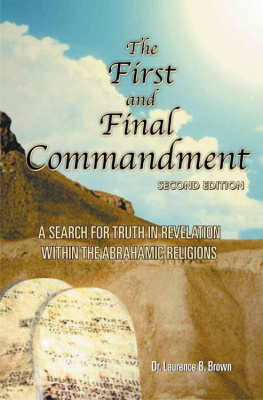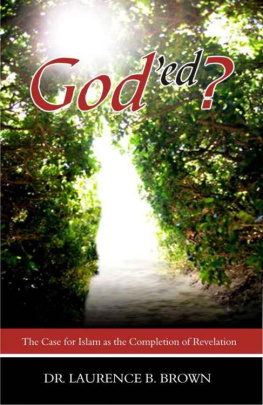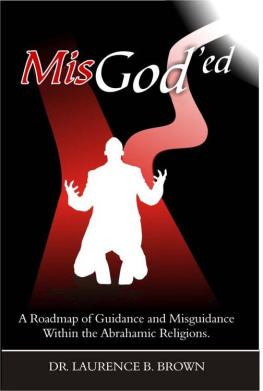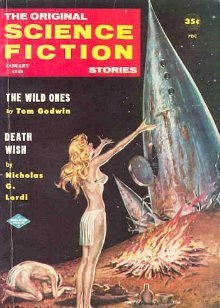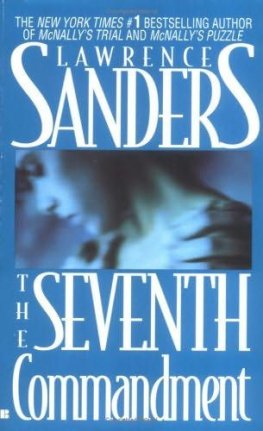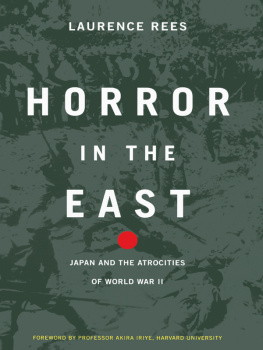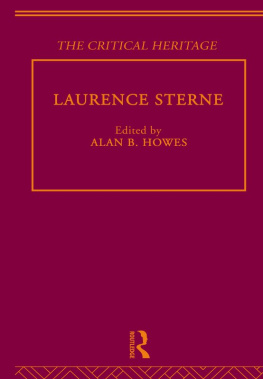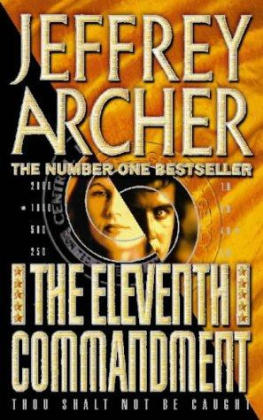Dr. Laurence B. Brown - The First and Final Commandment
Here you can read online Dr. Laurence B. Brown - The First and Final Commandment full text of the book (entire story) in english for free. Download pdf and epub, get meaning, cover and reviews about this ebook. year: 2010, publisher: CreateSpace, genre: Religion. Description of the work, (preface) as well as reviews are available. Best literature library LitArk.com created for fans of good reading and offers a wide selection of genres:
Romance novel
Science fiction
Adventure
Detective
Science
History
Home and family
Prose
Art
Politics
Computer
Non-fiction
Religion
Business
Children
Humor
Choose a favorite category and find really read worthwhile books. Enjoy immersion in the world of imagination, feel the emotions of the characters or learn something new for yourself, make an fascinating discovery.
- Book:The First and Final Commandment
- Author:
- Publisher:CreateSpace
- Genre:
- Year:2010
- Rating:3 / 5
- Favourites:Add to favourites
- Your mark:
- 60
- 1
- 2
- 3
- 4
- 5
The First and Final Commandment: summary, description and annotation
We offer to read an annotation, description, summary or preface (depends on what the author of the book "The First and Final Commandment" wrote himself). If you haven't found the necessary information about the book — write in the comments, we will try to find it.
The First and Final Commandment — read online for free the complete book (whole text) full work
Below is the text of the book, divided by pages. System saving the place of the last page read, allows you to conveniently read the book "The First and Final Commandment" online for free, without having to search again every time where you left off. Put a bookmark, and you can go to the page where you finished reading at any time.
Font size:
Interval:
Bookmark:

Commandment
A SEARCH FOR TRUTH IN REVELATION WITHIN
THE ABRAHAMIC RELIGIONS
BY
DR. LAURENCE B. BROWN
All scripture quotations, unless otherwise indicated, are taken from the New King James Version. Copyright 1982 by Thomas Nelson, Inc. Used by permission. All rights reserved.
Scripture quotations marked NRSV herein are from the New Revised Standard Version Bible, Copyright 1989 by the Division of Christian Education of the National Council of the Churches of Christ in the U.S.A. Used by permission. All rights reserved.
Copyright 2007 Dr. Laurence B. Brown
All rights reserved.
ISBN: 1-4515-6252-7
ISBN-13: 978-1451562521
T O
T HE LOVERS OF TRUTH,
T HE
F RIENDS OF FREE INQUIRY;
T O THOSE WHO DARE,
I N THE FACE OF CHURCH ESTABLISHMENTS,
O F
O RTHODOX DENUNCIATIONS,
A ND OF
L UKEWARM, TIME-SERVING CHRISTIANS,
T O OPENLY PROFESS
W HAT THEY BELIEVE TO BE TRUE:
T HIS VOLUME IS INSCRIBED.
Dedication by the Editor of:
An Enquiry into the Opinions of the Christian Writers of the Three First Centuries Concerning the Person of Jesus Christ,
by Gilbert Wakefield, B.A., 1824
Lord, make me an instrument of your peace;
Where there is hatred, let me sow love;
Where there is injury, pardon;
Where there is doubt, faith;
Where there is despair, hope;
Where there is darkness, light;
And where there is sadness, joy.
Grant that I may not so much seek to be consoled as to console;
To be understood as to understand;
To be loved as to love;
For it is in giving that we receive;
It is in pardoning that we are pardoned;
And it is in dying that we are born to eternal life.
Biblical quotes in the following work, unless otherwise noted, are taken from the New King James Version. The reason for selecting this version of the Bible does not relate to the degree of scriptural fidelity, which is debatable, but rather to the popularity of the text. In English-speaking countries, the 1611 edition of the King James Version is the most widely read translation of the Bible. The New King James Version (NKJV) grew from an effort to render the 1611 translation more accessible to modern readers, tossing the thees and thous out the window. Unfortunately, little effort has been made to reconcile differences between the 1611 King James Version and the Sinaiticus and Vaticanus codices, which were discovered in the 1800s and contain the oldest and most authoritative New Testament manuscripts found to date. Furthermore, most of the important copies of the Greek gospels have been unearthed mostly in museums, monasteries, and church archives in the nineteenth and twentieth centuries.. Now that these texts are available, one can reasonably expect to see their influence upon more modern Bible translations. This is not the case in the New King James Version, which retains verses and passages in conflict with the most ancient and respected New Testament manuscripts. Therefore, while this book predominantly cites the New King James Version in the interest of satisfying the Protestant majority of Western Christianity, a complementary version is employed where greater scholastic accuracy is required.
The New Revised Standard Version (NRSV) fills this gap. Like its predecessor, the Revised Standard Version (RSV), the NRSV is an ecumenical collaboration, reflected in its three separate Protestant, Roman Catholic, and Eastern Orthodox editions. More importantly, the NRSV reflects modern biblical scholarship hitherto unavailable. Indeed, the dust had barely been blown off the Dead Sea Scrolls when the RSV translation of the Old Testament was first published in 1946. For these reasons, the NRSV has effectively replaced the Revised Standard Version and enjoys the broadest acceptance of all Bible translations.
Quotations from the World Bibliography of Translations of the Meanings of the Holy Quran (hereafter TMQ), unless otherwise noted, are taken from Abdullah Yusuf Alis The Holy Quran: Translation and Commentary. Where more exacting translation is required, those of Saheeh International or of Muhammad Al-Hilali and Muhammad Khan (i.e., The Noble Quran) are employed.
For those who question the use of multiple translations, it should be said that no language, and most especially one as complex as Arabic, can be translated with complete accuracy. As orientalist and translator Alfred Guillaume stated, The Quran is one of the worlds classics which cannot be translated without grave loss.
Hence the need for multiple translations of the Quran, for no single translation, and some would say no collection of translations, can adequately convey the meaning of the original.
Where shall I begin, please your Majesty? he asked.
Begin at the beginning, the King said, gravely, and go on tillyou come to the end: then stop.
Lewis Carroll, Alices Adventures in Wonderland
Recent decades have witnessed a society-wide shift with regard to the values by which truth and quality are measured. In their homes and workplaces to community centers and town halls, our ancestors discussed subjects of depth and importance, vital issues such as political ethics, social mores and the practical limits of science, laws and religion. Jump forward to the modern world, and conversations typically focus on relationships, money, sports and entertainment. Whereas previous generations spent evenings in forums of discourse, analysis and intellectual exchange, most citizens of today subject themselves to vacuous hours of media brainwashing by that master of hypnosis, the television.
The results can be seen in every aspect of modern life. Salesmanship has come to rely less on factual analysis than on stylized presentation. Political offices are no longer won and lost on the basis of leadership qualities, social consciousness and moral example, but on photo ops and sound bites. News, both local and international, is spun to satisfy social and political agendas more than to convey events as they actually occurred.
Nowadays the general public is less reliant upon facts and more influenced by emotional ploys, even when false. Nowhere is this more evident than in religion, where the beliefs of billions have been swayed more by the media than by their own scripture. The image of Moses portrayed in the animated film, The Prince of Egypt, replaces previous generations mental picture of Charlton Heston in Cecil B. DeMilles The Ten Commandments. Yet both movies present a Hollywoodized Moses with dynamic oratory skills, ignoring the prophets own assessment on that score: O my Lord, I am not eloquent, neither before nor since You have spoken to Your servant; but I am slow of speech and slow of tongue (Exodus 4:10). Recent representations of Jesus Christ have similarly corrupted imaginations, with imagery that spans the spectrum from the rock opera Jesus Christ Superstar to accounts of this great messenger of God having married Mary Magdalene.
Spinning off from this swirl of generational trends, many religions have emerged with a new focusthat of style and emotional appeal. Rational analysis and theological discussion have been buried beneath an avalanche of popularized slogans and designer dogma. In this manner, hearts and souls are being seduced more by salesmanship than by truth.
Next pageFont size:
Interval:
Bookmark:
Similar books «The First and Final Commandment»
Look at similar books to The First and Final Commandment. We have selected literature similar in name and meaning in the hope of providing readers with more options to find new, interesting, not yet read works.
Discussion, reviews of the book The First and Final Commandment and just readers' own opinions. Leave your comments, write what you think about the work, its meaning or the main characters. Specify what exactly you liked and what you didn't like, and why you think so.

